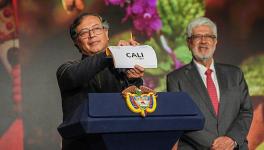It’s Time Charles Koch Testified About His Climate Disinformation Campaign
The U.S. House Oversight and Reform Committee kicked off its investigation of the fossil fuel industry’s decades-long climate change disinformation campaign last fall by inviting top executives from BP, Chevron, ExxonMobil and Shell to testify about their role and subpoenaing their companies for internal documents.
The committee followed up that hearing—during which the executives disingenuously denied funding such a campaign—with another hearing on February 8 focusing on the oil companies’ inadequate plans to cut their carbon emissions.
The next round is slated to feature board directors from the same four oil companies testifying on their companies’ climate pledges, followed by testimony from social media companies and advertising agencies about the part they have played in manufacturing doubt about climate change.
But before the committee wraps up its investigation, it would be sorely remiss if it didn’t haul in libertarian industrialist Charles Koch, the Daddy Warbucks of climate disinformation, for questioning.
The 20th-richest person in the world with a net worth of $58 billion, Koch, 86, is the longtime CEO of Koch Industries, a conglomerate that owns oil refineries and pipelines; markets crude oil, coal, chemicals, wood pulp and paper; trades energy derivatives; and boasts annual revenues of $115 billion.
The second-largest privately held company in the country, Koch Industries is one of the top 25 U.S. corporate water and carbon polluters, is a defendant in a climate accountability lawsuit brought by the state of Minnesota, and is continuing to operate its businesses in Russia while Koch-backed groups oppose U.S. sanctions imposed on the Kremlin after it invaded Ukraine.
Koch-controlled foundations donated more than $145 million to a network of 90 think tanks and advocacy groups from 1997 through 2018 to disparage climate science and block efforts to address climate change. Since the death of Charles Koch’s brother David in 2019, the Charles Koch Foundation has continued to finance this disinformation campaign, giving more than $17 million to 23 groups in 2019 and 2020, pushing the Koch grand total north of $162 million. By contrast, the second-largest funder of climate disinformation, ExxonMobil, spent $39.2 million on some 70 denier groups from 1998 through 2020.
To maintain leverage on Capitol Hill, Koch Industries’ political action committee (PAC), affiliates and employees also contribute significantly more to federal candidates, party committees, outside groups, leadership PACs and 527 groups than their counterparts at BP America, Chevron, ExxonMobil or Shell. In the 2018 and 2020 election cycles, Koch Industries’ total outlay of $26.7 million was more than the $21.7 million the four oil and gas companies contributed collectively.
In addition, Koch Industries spent more than $38 million on its Washington lobbying operation during the last two full election cycles, from 2017 through 2020. That’s slightly less than ExxonMobil’s $40.98 million and Chevron’s $39.47 million, but the company enjoyed a distinct advantage over the two oil giants besides outspending them on campaign contributions: President Donald Trump’s transition team head, Vice President Mike Pence—a longtime Koch network veteran who played a key role in promoting the Koch-founded and -funded Americans for Prosperity’s “No Climate Tax” pledge when he was in the House—tapped at least 50 Koch network alumni to work inside the Trump administration. They included Education Secretary Betsy DeVos, Energy Secretary Rick Perry, Environmental Protection Agency Administrator Scott Pruitt and White House Legislative Affairs Director Marc Short. Egged on by Koch devotees both inside and outside the government, the Trump administration rolled back at least 260 regulations, including more than 100 environmental rules.
The Biden administration cleared out the Koch disciples when it took office and is in the process of rolling back the Trump rollbacks, but Koch and his donor network still hold considerable sway over the Republican Party. They will continue to spend hundreds of millions on Capitol Hill and, looking ahead to 2024, a number of Koch network stalwarts are considering a run for president, including Pence, Texas Senator Ted Cruz, Florida Governor Ron DeSantis, former Secretary of State Mike Pompeo and Florida Senator Rick Scott. The Koch network, with its toxic anti-government bias, will likely cast a long shadow over Washington for years to come.
Decades of Disinformation
For more than two decades, the Koch network has been diligently spreading disinformation to sabotage efforts to transition to a clean energy economy, more often than not by attacking proposed climate policies on economic grounds. Examples of its malfeasance are legion:
- To stop a version of the Waxman-Markey cap-and-trade bill in the Senate after it squeaked by in the House in 2009, Americans for Prosperity persuaded a critical mass of lawmakers to sign its “No Climate Tax” pledge, disingenuously calling the bill “the largest excise tax in history.” Since then, the overwhelming majority of legislators who have received campaign contributions from Koch Industries’ PAC and employees have rejected a carbon tax in amendments and nonbinding resolutions.
- To slow the exponential growth of solar power, the Koch-funded American Legislative Exchange Council has armed utilities and state lawmakers with model legislation against net metering, which credits solar panel owners for the excess energy they generate and return to the grid, claiming that rooftop solar credits will drive up non-solar customers’ electric rates. The Energy Department, however, concluded that the credits will have a negligible impact on monthly electric bills.
- To undermine the widespread adoption of electric vehicles (EVs), the Koch network has urged Congress to kill the federal income tax credit for EV buyers. “Congress should not be in the business of picking winners and losers by subsidising one form of energy over others, regardless of its source,” Philip Ellender, Koch Industries’ president of government and public affairs, argued in a letter to Congress in October 2018. Never mind that the oil and gas industry has benefited from massive annual federal subsidies for more than 100 years.
- After succeeding in prodding President Trump to withdraw the United States from the Paris climate agreement, arguing that the accord would threaten the “economic future of our country,” the Koch network is now spearheading a campaign to kill the Biden administration’s Build Back Better plan, falsely claiming that it “is the biggest spending bill in American history.”
There are plenty of other examples, but the above sample illustrates the breadth of the Koch network’s reach. Charles Koch and his fellow travellers have played an outsized role scaring the public about the potential impact of climate solutions on their pocketbooks (but at the same time, they spent more than $20 million to promote President Trump’s $1.5-trillion tax cut that largely benefited corporations and the ultra-wealthy). By practically any measure, Koch is as consequential a disinformer as the four oil company executives who testified last fall before the House Oversight Committee combined.
Put Koch Under Oath
If the House Oversight Committee called Charles Koch to testify, it could, for starters, ask him about his views on climate change.
The executives from BP, Chevron, ExxonMobil and Shell who testified last October downplayed the central role human activity—mainly burning fossil fuels—plays in triggering climate change, but after much hemming and hawing they all conceded that global warming poses an “existential threat.”
Koch, for his part, has never acknowledged that climate change is a serious problem and rarely talks about it publicly. On the rare occasion when reporters broach the topic, he responds with… disinformation.
Koch’s most recent public comments about climate change came during lengthy interviews with the Washington Post in 2015 and 2016. Asked if he worried about climate change in an August 2015 interview, Koch replied that he believes “it’s been warming some” but added that “[t]here’s a big debate on that, because it depends on whether you use satellite measurements, balloon[s], or you use ground ones that have been adjusted.” Climate scientists, he added, “have these models that show it, but the models don’t work….”
In fact, all of the measurements Koch cited indicate that there has been a long-term global warming trend due to climate change. And, coincidentally, just a week before the Washington Post published the Koch interview, a peer-reviewed study found that global climate models are even more accurate than previously thought.
In August 2016, the Washington Post ran another Koch interview, during which he was asked if anyone could produce a study that would convince him “that carbon regulation is necessary to heed off disastrous global warming.” “Yeah,” Koch replied. “If we… use the scientific method rather than trying to shut down and shout down and punish anybody who wants to enter into debate about it…. If we’re all trying to find the truth of the matter, then I’m all for that.”
Notably, Koch did try to get to the truth of the matter in his own way a few years earlier. The Charles Koch Foundation donated $150,000 to Berkeley Earth, a non-profit research institute founded in 2010 by Richard Muller, a physicist and self-proclaimed climate science skeptic, to review the temperature data that underpinned global-warming claims. Presumably to Koch’s surprise—and dismay—Muller announced in a July 2012 New York Times op-ed that his investigation verified that global warming is indeed real, is “almost entirely” caused by human activity, and is even worse than what the climate science community had concluded at the time.
It would be enlightening for the House Oversight Committee to ask Koch about Berkeley Earth’s findings, especially since after Muller announced them, the Koch network stepped up its campaign to characterize climate policies as being too costly, despite the fact that the consequences of failing to curb carbon emissions will cost infinitely more than taking preventive measures.
In late 2012, for example, the Koch brothers financed “bogus studies” falsely claiming that state standards requiring utilities to ramp up their use of renewable energy would dramatically drive up electric rates. Six years later, in 2018, when the House was about to vote on a nonbinding carbon tax resolution, Ellender—the Koch Industries lobbyist—took the same tack. “A carbon tax would make energy more expensive and raise the costs of consumer products and services on which people depend,” he wrote in a letter to the lawmakers. “It would also make U.S. producers less cost competitive, driving production and jobs to other parts of the world.”
The House passed the resolution, which stated that “a carbon tax would be detrimental to the United States economy,” by a 229 to 180 vote. Nearly 70% of the representatives who voted for the resolution—159—collectively received more than $1.28 million in campaign contributions from Koch Industries PAC and employees during the 2018 election cycle.
Investing in Clean Energy While Trashing It
Koch’s jaundiced take on climate change would undoubtedly be welcomed by the 20 Republican members of the Oversight Committee, 14 of whom are climate science deniers. During the 2020 election cycle alone, Koch Industries’ employees and PAC gave more than $136,000 in campaign contributions to 18 of the GOP committee members, while their counterparts at BP, Chevron, ExxonMobil and Shell collectively donated $40,347 to 14 of them.
The committee members who are less beholden to the fossil fuel industry, however, should take the opportunity to press Koch about his company’s seemingly contradictory investments in sectors that his network is still trying to knee-cap, such as electric vehicles and renewable energy.
The Wall Street Journal recently reported that Koch Industries subsidiaries have invested at least $750 million in a range of battery technologies and battery-related raw materials, chemicals and recycling. Among the Koch conglomerate’s relatively new holdings are New Jersey zinc battery startup Eos Energy Enterprises and Canada’s lithium-ion battery recycler Li-Cycle Holdings, lithium development company Standard Lithium, and Lithion Power Group, a lithium-ion battery startup.
Likewise, Koch subsidiaries have jumped into smart grid and electric vehicle charging technologies. In 2020, Koch Engineered Solutions acquired Sentient Energy, a smart grid solutions company, and last year Koch Strategic Platforms invested in EVBox, a Netherlands-based electric vehicle charging station manufacturer.
Koch Engineered Solutions is also bullish on solar, but not on distributed rooftop solar, which the Koch network has been trying to stop. Last November, it bought DEPCOM Power, an Arizona company that builds large-scale solar power plants, and plans to supply solar farms in the United States and Canada.
Koch Industries’ relatively recent investments in batteries and renewables—which, granted, amount to a tiny percentage of the conglomerate’s far-flung operations—are just the beginning, according to Koch Engineered Solutions President Dave Dotson. “We are believers in the electrification of everything, driven by economics and consumer trends,” he told S&P Global Market Intelligence, “and look for where we can add value across the electric value chain from generation to end-user consumption.”
Dotson’s business strategy should come as a surprise to anyone who has been closely following his boss, and should prompt the House Oversight Committee to ask Koch how his company’s recent shopping spree squares with his network’s ongoing campaign against climate solutions.
An unabashed libertarian, Koch likely would respond that the private sector should take the lead, not the government, on energy—and just about everything else. For Koch, government efforts to manage the economy, protect public health and the environment, and provide social welfare programs are a slippery slope to totalitarianism and must be rolled back, if not eliminated. In his most recent book (co-authored with Brian Hooks), Believe in People: Bottom-Up Solutions for a Top-Down World, Koch argues that individuals, corporations and nonprofit groups are better suited to solve society’s most pressing problems—including the coronavirus pandemic—than the government.
Koch’s philosophy, however, fails to account for the fact that it was the private sector—specifically the fossil fuel industry—that got us into the dire situation in which we find ourselves today, faced with increasingly severe climate change-driven impacts. Major oil companies were aware their products wreck the climate at least 50 years ago and have spent hundreds of millions of dollars since then to manufacture doubt about climate science, disparage renewables and block government action.
Now that Koch Industries, as well as some oil majors, see that there is money to be made by diversifying into clean energy technologies, they are slowly adding them to their portfolios but spending a fraction of what they are still dedicating to their oil, gas and chemical operations. It’s much too little, much too late.
If the House Oversight Committee is serious about getting to the bottom of the fossil fuel industry’s longtime campaign to stymie climate policy, it should call Koch on the carpet. By doing so, the committee could shine a light on his prominent role in sponsoring disinformation, as well as expose the threat he and his followers pose to U.S. democracy.
Elliott Negin is a senior writer at the Union of Concerned Scientists.
This article was produced by Earth | Food | Life, a project of the Independent Media Institute.
Get the latest reports & analysis with people's perspective on Protests, movements & deep analytical videos, discussions of the current affairs in your Telegram app. Subscribe to NewsClick's Telegram channel & get Real-Time updates on stories, as they get published on our website.























